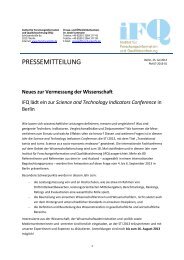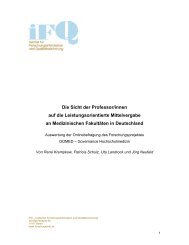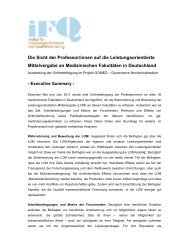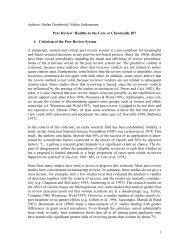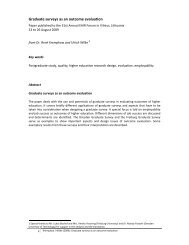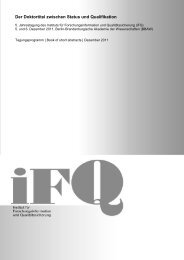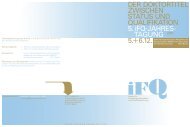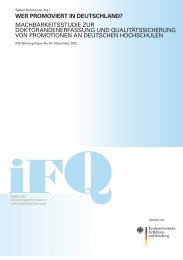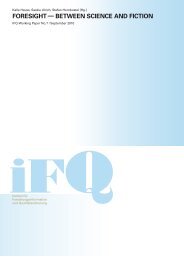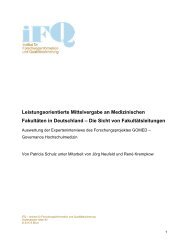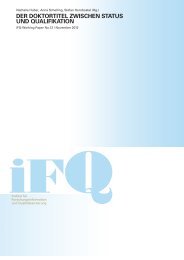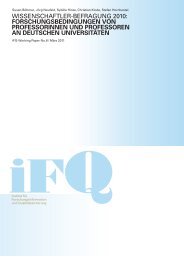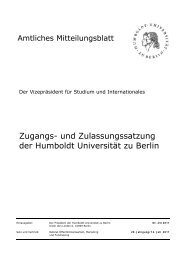Foresight – between science and fiction - IFQ Institut für ...
Foresight – between science and fiction - IFQ Institut für ...
Foresight – between science and fiction - IFQ Institut für ...
You also want an ePaper? Increase the reach of your titles
YUMPU automatically turns print PDFs into web optimized ePapers that Google loves.
3. Jahrestagung des <strong>Institut</strong>s <strong>für</strong> Forschungsinformation und Qualitätssicherung - iFQ<br />
Book of short abstracts: <strong>Foresight</strong> <strong>–</strong> <strong>between</strong> <strong>science</strong> <strong>and</strong> <strong>fiction</strong><br />
11. und 12. Dezember 2008, caesar, Ludwig-Erhard-Allee 2, 53175 Bonn<br />
7
<strong>Foresight</strong> - <strong>between</strong> <strong>science</strong> <strong>and</strong> <strong>fiction</strong><br />
3. Jahrestagung des iFQ 2008<br />
11. und 12. Dezember,<br />
im caesar <strong>–</strong> center of advanced european studies <strong>and</strong> research,<br />
Ludwig-Erhard-Allee 2, 53175 Bonn, Germany<br />
Vor wichtigen Entscheidungen einen Blick in die Zukunft zu werfen, gehörte zu den magisch-religiösen<br />
Praxen fast aller Hochkulturen. Galt es in der Antike den Götterwillen zu erkunden und mit den gelegentlich<br />
tragischen Fehlinterpretationen der Vorhersage einer mehr oder weniger determinierten Zukunft<br />
fertig zu werden, entwarf die moderne Wissenschaft das Bild einer offenen Zukunft.<br />
Als Amalgam aus Gesellschafts- und Wissenschaftsutopie war es die Literatur, die sowohl die so entst<strong>and</strong>enen<br />
Möglichkeitsräume erkundete, als auch pfadabhängige, apokalyptische Entwicklungsszenarien<br />
entwarf. Beschleunigte wissenschaftliche Entwicklung hat aber nicht nur den Science Fiction Roman zur<br />
permanenten Revision gegenwärtiger Zukunft genötigt, sondern auch der Wissenschaft und der Politik<br />
die Frage nach zukünftiger Gegenwart aufgenötigt.<br />
Die Wissenschaft selbst versucht inzwischen ihre eigene Zukunft zu erkunden, ebenso wie die Politik<br />
nach Antworten auf die Frage sucht, wo sich besonders viel versprechende wissenschaftliche Entwicklungen<br />
und mögliche technologische oder wirtschaftliche Anwendungen abzeichnen. Betroffen sind auch<br />
diejenigen, die Forschung materiell fördern und mit ihren Programmen Weichenstellungen <strong>für</strong> oder gegen<br />
Zukunftsoptionen treffen.<br />
Welche Wege dabei in unterschiedlichen Ländern und Förderorganisationen beschritten werden, welche<br />
Methoden zum Einsatz kommen und welche politischen Konsequenzen aus der Vergegenwärtigung von<br />
Zukunft gezogen werden, ist Gegenst<strong>and</strong> der diesjährigen iFQ Jahrestagung im caesar in Bonn.<br />
Da auch „<strong>Foresight</strong> Studies“ inzwischen auf eine Vergangenheit zurückblicken, gilt es natürlich auch der<br />
alten Frage nachzugehen, ob die Zukunft hinreichend erkannt werden konnte oder die Zeichen missdeutet<br />
wurden.<br />
Diese Frage nach der Lesbarkeit der Welt wird illustriert durch eine begleitende Ausstellung „Places &<br />
Spaces: Mapping Science“ (www.scimaps.org), die mit einer ästhetisch anspruchsvollen Kartographie der<br />
Wissenschaft versucht Vergangenheit und Zukunft anschaulich zu machen.<br />
Konferenzsprachen sind Englisch und Deutsch. Eine Simultanübersetzung vom Deutschen ins Englische<br />
wird angeboten.<br />
Wichtige Daten:<br />
11.-12. Dezember 2008: Konferenz<br />
11.-19. Dezember 2008: Ausstellung „Places & Spaces: Mapping Science“ (www.scimaps.org)<br />
Für Referenten:<br />
31. Oktober 2008: Frist Vortragsabstract, Kurzbiographie<br />
15. Januar 2009: Frist ausformulierter Beitrag (max. 20 Seiten)<br />
Onlineregistrierung auf: www.forschungsinfo.de<br />
3
Wege zum Konferenzort<br />
Forschungszentrum caesar, Ludwig-Erhard-Allee 2, 53175 Bonn, Telefon +49-228-9656-0<br />
Mit dem Flugzeug<br />
Vom Flughafen Köln/Bonn aus kostet die Anreise mit dem Taxi (30 Minuten) ca. 30 Euro. Alternativ<br />
kann die Buslinie 670 vom Flughafen in Richtung Bonn genommen werden. Steigen Sie Bonn Hauptbahnhof<br />
aus und nehmen Sie von hier aus die Buslinie 610 in Richtung Heiderhof. Steigen Sie an der<br />
Haltestelle Kennedyallee aus.<br />
Weitere Informationen erhalten Sie beim Flughafen Köln/Bonn<br />
Mit der Bahn<br />
Vom Bonner Hauptbahnhof aus erreichen Sie caesar in ca. 20 Minuten mit der Buslinie 610 Richtung<br />
Heiderhof. Steigen Sie an der Haltestelle Kennedyallee aus.<br />
Weitere Informationen erhalten Sie bei der Deutschen Bahn<br />
Mit dem Auto<br />
Fahren Sie auf der Autobahn 59/562 Richtung Bonn-Bad Godesberg, Ausfahrt Rheinaue, dann links in<br />
die Ludwig-Erhard-Allee.<br />
Oder fahren Sie auf der Autobahn 565 in Richtung Koblenz und nehmen die Ausfahrt Bonn-<br />
Poppelsdorf. Folgen Sie der Reuterstrasse in die Willy-Br<strong>and</strong>t-Allee bis zur Kreuzung Hochkreuzallee.<br />
Biegen Sie hier links in die Kennedyallee ab und folgen dieser bis zur Kreuzung Ludwig-Erhard-<br />
Allee/Kennedyallee.<br />
4
Programm<br />
Donnerstag, 11.12.2008<br />
10:30 Begrüßung<br />
Stefan Hornbostel, iFQ <strong>–</strong> <strong>Institut</strong> <strong>für</strong> Forschungsinformation und Qualitätssicherung<br />
I. Science Fiction und Wissenschaft<br />
11:00 Utopien und Visionen in der Wissenschaft<br />
Thomas Macho, Humboldt-Universität zu Berlin<br />
11:30 Science <strong>fiction</strong> as a provider of guiding images for innovation <strong>–</strong> historical examples,<br />
experiences from innovation processes <strong>–</strong> a critical perspective of a futurist<br />
Karlheinz Steinmüller, Z_punkt The <strong>Foresight</strong> Company<br />
12:00 Diskussion<br />
12:30 Mittagspause<br />
II. Wissenschaft und <strong>Foresight</strong>: Prognosen und Trends<br />
13:30 Prognosen - ihre Grenzen und ihre Rolle in der Planung<br />
Uwe Wiemken, Fraunhofer-<strong>Institut</strong> <strong>für</strong> Naturwissenschaftlich-Technische Trendanalysen INT<br />
14:00 Studying knowledge dynamics for foresight an approach <strong>and</strong> some examples<br />
Peter van den Besselaar, Science System Assessment, Rathenau Instituut & Universiteit van Amsterdam<br />
14:30 Diskussion<br />
14:50 <strong>Foresight</strong> in research on civil security<br />
Sylvie Rijkers-Defrasne, VDI Technologiezentrum GmbH<br />
15:20 Many foresee more than one: A collaborative approach to in silico <strong>science</strong><br />
Christine Chichester, KNEWCO<br />
15:50 Diskussion<br />
16:10 Kaffeepause<br />
III. Wissenschaftspolitik und Strategien im internationalen Vergleich (1)<br />
16:40 Setting European research agendas: European foresight strategies in context<br />
Rüdiger Klein, ESF - European Science Foundation<br />
17:10 Der BMBF-<strong>Foresight</strong>-Prozess: Schwerpunkte in Technologie und Forschung in Deutschl<strong>and</strong><br />
Otto Bode, Bundesministerium <strong>für</strong> Bildung und Forschung<br />
17:40 Diskussion<br />
18:30 Sektempfang und Ansprache anlässlich der Eröffnung der Ausstellung:<br />
Places & Spaces: Mapping Science<br />
Katy Börner, Indiana University<br />
5
6<br />
Freitag, 12.12.2008<br />
III. Wissenschaftspolitik und Strategien im internationalen Vergleich (2)<br />
9:30 Science <strong>and</strong> technology foresight in Japan<br />
Kerstin Cuhls, Fraunhofer-<strong>Institut</strong> <strong>für</strong> System- und Innovationsforschung ISI<br />
10:00 <strong>Foresight</strong> in Latin America: Experiences in six countries<br />
Yuli Villarroel, Universidad Nacional Experimental Simón Rodríguez<br />
10:30 Diskussion<br />
10:50 Kaffeepause<br />
IV. Theorien und Methoden: Alte und neue Ansätze in <strong>Foresight</strong> Studies<br />
11:20 <strong>Foresight</strong> methodology - overview<br />
Rafael Popper, PREST Manchester <strong>Institut</strong>e of Innovation Research<br />
11:50 Das Technologieexperten-Delphi der Prognos AG <strong>–</strong> Aufbau, Erfahrungen, Ausblick<br />
Oliver Pfirrmann, Prognos AG<br />
12:20 The scope of bibliometric approaches in foresight studies<br />
Anthony F.J. van Raan, Centre for Science <strong>and</strong> Technology Studies (CWTS), Leiden University<br />
12:50 Diskussion<br />
13:20 Mittagspause<br />
V. Der <strong>Foresight</strong>-Prozess zwischen Prognose und Wirklichkeit:<br />
Wie valide sind die Ergebnisse?<br />
14:20 Evaluation des BMBF-<strong>Foresight</strong>-Prozesses<br />
Melanie Kramp, <strong>Institut</strong> <strong>für</strong> Technologie und Arbeit<br />
14:50 “Der Studentenberg”: Prognosis <strong>and</strong> reality<br />
Dieter Dohmen, FiBS <strong>–</strong> Forschungsinstitut <strong>für</strong> Bildungs- und Sozialökonomie<br />
15:20 Diskussion<br />
15:40 Ausblick<br />
Kalle Hauss <strong>and</strong> Saskia Heise, iFQ <strong>–</strong> <strong>Institut</strong> <strong>für</strong> Forschungsinformation und Qualitätssicherung<br />
Organisationskommitee<br />
Kalle Hauss, Saskia Heise<br />
Tel +49 (0)228/97273-16/14,<br />
Fax +49 (0)228/97273-49<br />
Mail hauss@forschungsinfo.de,<br />
heise@forschungsinfo.de
Stefan Hornbostel, <strong>Institut</strong> <strong>für</strong> Forschungsinformation und Qualitätssicherung<br />
Einführung<br />
Abstract Unser Begriff von „in die Zukunft sehen“, weist bereits in die Vergangenheit zurück. Es ist das<br />
griechische prógnosis, das „Vorauswissen“ mit dem wir den Blick in die Zukunft üblicherweise bezeichnen.<br />
Insoweit ist der Umgang mit Zukunft nicht neu, er gehört zu den magisch-religiösen Praxen fast aller<br />
Hochkulturen und es ist wohl eine anthropologische Besonderheit das „ich werde gewesen sein“ zu denken.<br />
Dennoch hat Niklas Luhmann Recht, wenn er feststellt, dass die Vergangenheit der Zukunft nicht<br />
allzu weit zurückreicht, denn zwischen der heilsgeschichtlich definierten Zukunft im Mittelalter, die die<br />
Gegenwart zu einer transitorischen Phase in einer teleologisch definierten Weltgeschichte macht und der<br />
modernen Vorstellung einer entwicklungsoffenen Zukunft liegen kaum überbrückbare Differenzen. In<br />
diesem Sinne beginnt die Zukunft mit der tiefgreifenden Temporalisierung der frühen Industriegesellschaft.<br />
Erst ab dieser Zeit werden „Zeitreisen“ auch mit wissenschaftlichen Methoden möglich und unternommen.<br />
Dabei ist es zunächst der veränderte Blick auf die Vergangenheit durch die Geschichtswissenschaft<br />
der neue Zukünfte eröffnet. Daneben aber entsteht ein instrumenteller Zugriff auf die Zukunft:<br />
Börsen und Kreditgeschäfte machen die unkalkulierbare Zukunft zur zukünftigen Gegenwart und die<br />
Gegenwart zur vergangenen Zukunft. Die aktuelle Finanzkrise führt drastisch vor Augen, wie eng unsere<br />
Gegenwart inzwischen mit der vergangenen, geplanten Zukunft verbunden ist. Das letzte Jahrhundert war<br />
durch die Perfektionierung der Prognose gekennzeichnet: Von der Entdeckung der Kondratieff-Zyklen<br />
im frühen 20. Jahrhundert über die naiven Zukunftsvisionen der 60er Jahre, die Planungseuphorie der<br />
70er Jahre, die Untergangsszenarien des Club of Rome bis zur schönen Welt der New Economy. Das<br />
letzte Jahrhundert war aber auch eines der Fehlprognosen, Ernüchterungen und unkalkulierbaren Überraschungen.<br />
Die offene Zukunft und die Technik der linearen Regression der Vergangenheit wollten offenkundig<br />
nicht recht zu ein<strong>and</strong>er passen. Dieses Dilemma kennzeichnet geradezu die Zukunftsforschung,<br />
die sich mit dem Paradox abmüht das Undenkbare zu denken und das Unwahrscheinliche vorauszusehen<br />
und als Szenario verfügbar zu machen. Das scheint <strong>–</strong> trotz der paradoxalen Anforderung - auch notwendig,<br />
denn moderne Gesellschaften betreiben einen extensiven Zukunftsverbrauch, der dazu führt, dass<br />
immer stärker in der Gegenwart über zukünftige Gegenwarten entschieden wird. Insofern ist auch das<br />
Offenhalten der Zukunft ebenso zum Politikum geworden, wie die Entscheidung zwischen verschiedenen<br />
Zukünften.<br />
Als Amalgam aus Gesellschafts- und Wissenschaftsutopie war es die Literatur, die sowohl die entst<strong>and</strong>enen<br />
Möglichkeitsräume erkundete, als auch pfadabhängige, apokalyptische Entwicklungsszenarien entwarf.<br />
Beschleunigte wissenschaftliche Entwicklung hat aber nicht nur den Science Fiction Roman zur<br />
permanenten Revision gegenwärtiger Zukunft genötigt, sondern auch der Wissenschaft und der Politik die<br />
Frage nach zukünftiger Gegenwart aufgenötigt. Die Wissenschaft kommt dabei auf mehrfache Weise ins<br />
Spiel: Sie liefert nicht nur das Material <strong>für</strong> die Zukunftsprognose, sondern auch den Stoff <strong>für</strong> die Kritik<br />
der Prognose. Vor allen Dingen aber ist Wissenschaft inzwischen nicht nur Akteur, sondern selbst Objekt<br />
von Zukunftsplanungen, sowohl im Hinblick auf ihre internen Entscheidungsprozesse wie hinsichtlich der<br />
wissenschaftspolitischen Steuerungsimpulse. Neben die präzise Wetterprognose ist inzwischen auch die<br />
bibliometrisch gestützte Prognose zukünftig ertragreicher Forschungsfelder getreten.<br />
Curriculum Vitae Prof. Dr. Stefan Hornbostel is Director of the <strong>Institut</strong>e for Research Information<br />
<strong>and</strong> Quality Assurance (<strong>IFQ</strong>) <strong>and</strong> professor at the <strong>Institut</strong>e for Social Sciences at the Humboldt University<br />
of Berlin. Stefan Hornbostel, born in 1955, studied social <strong>science</strong>s at the University of Göttingen. He<br />
started his career at the Research Centre for occupational <strong>and</strong> higher education research” (now INCHER)<br />
at the University of Kassel (1984-1986). In 1987 he changed to the University of Cologne. After a stay<br />
abroad in Barcelona (Spain) he worked at the University of Jena. Having received his doctor’s degree at<br />
the Free University of Berlin he became assistant professor at the University of Jena. From 1998-2000 he<br />
was furloughed as a scientific referee to the Centre of Higher Education Development (CHE). In 2004 he<br />
was appointed to a professorship at the <strong>Institut</strong>e for Sociology at the University of Dortmund.<br />
7
I. Science Fiction und Wissenschaft<br />
Thomas Macho, Humboldt-Universität zu Berlin<br />
Utopien und Visionen in der Wissenschaft<br />
Curriculum Vitae 1952 in Wien geboren; Studium der Philosophie, Musikwissenschaft und Pädagogik<br />
an der Universität Wien; 1976 Promotion (mit einer Dissertation zur Philosophie der Musik); 1984 Habilitation<br />
<strong>für</strong> das Fach Philosophie (mit einer Habilitationsschrift über Todesmetaphern); 1976-1987 Universitätsassistent,<br />
ab 1984 Universitätsdozent <strong>für</strong> Philosophie am <strong>Institut</strong> <strong>für</strong> Philosophie der Universität<br />
Klagenfurt; 1987-1992 Leiter des Studienzentrums <strong>für</strong> Friedensforschung in Stadtschlaining (Österreich);<br />
1993 Berufung auf den Lehrstuhl <strong>für</strong> Kulturgeschichte an der Humboldt-Universität Berlin; Gastprofessuren<br />
an der Universität Klagenfurt, an der Kunstuniversität Linz und am <strong>Institut</strong> <strong>für</strong> interdisziplinäre Forschung<br />
und Fortbildung in Wien; 1999 Mitbegründung des »Hermann von Helmholtz-Zentrums <strong>für</strong> Kulturtechnik«<br />
an der Humboldt-Universität Berlin; 2000 Fellow am »Internationalen Forschungszentrum<br />
Kulturwissenschaften« in Wien; 2001-2003 Sprecher der DFG-Forschergruppe »Bild <strong>–</strong> Schrift <strong>–</strong> Zahl«;<br />
2001 Preisträger der Aby-Warburg-Stiftung Hamburg; 2003-2006 Direktor des <strong>Institut</strong>s <strong>für</strong> Kultur- und<br />
Kunstwissenschaften; 2005-2006 Sprecher des DFG-Graduiertenkollegs »Codierung von Gewalt im medialen<br />
W<strong>and</strong>el«; 2003-2005 Prodekan, und seit 2006 Dekan der Philosophischen Fakultät III der Humboldt-<br />
Universität Berlin.<br />
8
Karlheinz Steinmüller, Z_punkt The <strong>Foresight</strong> Company<br />
Science <strong>fiction</strong> as a provider of guiding images for innovation <strong>–</strong><br />
historical examples, experiences from innovation processes <strong>–</strong><br />
a critical perspective of a futurist<br />
Abstract Science <strong>fiction</strong> is not only a mirror of ongoing trends <strong>and</strong> future expectations in <strong>science</strong>, technology<br />
<strong>and</strong> society, it also provides guiding images for innovation - <strong>and</strong> it is therefore one of the many<br />
cultural factors shaping the future.<br />
The presentation is aimed to show which role <strong>science</strong> <strong>fiction</strong> can play in innovation processes with examples<br />
taken from the history of technology <strong>and</strong> recent experiences. It describes the peculiarities of thought<br />
experiments in <strong>science</strong> <strong>fiction</strong>s in terms of metaphoric character, contextualisation, <strong>and</strong> implicit or explicit<br />
value statements. The approaches of <strong>science</strong> <strong>fiction</strong> <strong>and</strong> foresight studies are compared <strong>and</strong> conclusions<br />
drawn with respect to the limitations as well of <strong>science</strong> <strong>fiction</strong> <strong>and</strong> foresight.<br />
Curriculum Vitae Karlheinz Steinmüller is scientific director <strong>and</strong> founding partner of “Z_punkt<br />
GmbH <strong>–</strong> The <strong>Foresight</strong> Company”. As project manager he is engaged in future studies for large, mostly<br />
German, enterprises <strong>and</strong> public administrations. His special fields of expertise include innovations in<br />
companies <strong>and</strong> society, technological foresight <strong>and</strong> technology assessment, scenarios <strong>and</strong> wild cards. He<br />
has also done research into the history <strong>and</strong> methodology of foresight.<br />
Steinmüller has a background in solid-state semiconductor physics, philosophy of <strong>science</strong> <strong>and</strong> ecosystem<br />
modelling. Together with his wife Angela he has written three <strong>science</strong> <strong>fiction</strong> novels, lots of <strong>science</strong> <strong>fiction</strong><br />
stories <strong>and</strong> a biography of Charles Darwin. Recent non-<strong>fiction</strong> books of the Steinmüllers’ include Visions<br />
1900 <strong>–</strong> 2000 <strong>–</strong> 2100. A Chronology of the Future (1999), Wild Cards. When the Improbable Happens<br />
(2004), <strong>and</strong> The Future of Technologies (2006) (all only in German). A new edition of all <strong>science</strong> <strong>fiction</strong><br />
writings of the Steinmüllers’ is under preparation; the first five volumes have already appeared.<br />
9
II. Wissenschaft und <strong>Foresight</strong>: Prognosen und Trends<br />
Uwe Wiemken, Fraunhofer, INT<br />
Prognosen - ihre Grenzen und ihre Rolle in der Planung<br />
Abstract In dem Vortrag werden in einer kurzen Analyse erfolgreiche und nicht erfolgreiche technologische<br />
Prognosen aus der Vergangenheit zusammengestellt und kommentiert. Es soll der Frage nachgegangen<br />
werden, welche Aussagekraft solche Prognosen haben und welche Rolle sie in der konkreten vorsorglichen<br />
Zielfindung und Planung des Staates oder auch eines Unternehmens spielen können.<br />
Curriculum Vitae <strong>Institut</strong>sleiter Fraunhofer-<strong>Institut</strong> <strong>für</strong> Naturwissenschaftlich-Technische Trendanalysen.<br />
Jahrgang 1945, 1965 <strong>–</strong>1972 Studium der Physik in Hamburg <strong>and</strong> Kiel, 1972 Diplom, 1974 Promotion<br />
zum Dr. rer. nat. (Experimentalphysik), 1974 Fraunhofer-<strong>Institut</strong> <strong>für</strong> Naturwissenschaftlich-Technische<br />
Trendanalysen, Stohl b. Kiel, 1977 Umzug nach Euskirchen (mit dem INT), seit 2001, <strong>Institut</strong>sleiter des<br />
INT, seit 1997 bzw. 2007 Lehraufträge an der Fachhochschule Köln und Bonn-Rhein-Sieg<br />
Berufliche Schwerpunkte<br />
Wissenschaftliche Entscheidungshilfen in langfristigen Planungsabläufen (welche Rolle kann die Wissenschaft<br />
in realen politischen und planerischen Entscheidungsprozessen spielen?). Langfristige Technologieprognosen<br />
und Technikfolgenabschätzungen mit Schwerpunkt im Bereich Sicherheit und Verteidigung<br />
(welche technologischen Entwicklungen werden langfristig welche Rolle spielen?). Internationale F&T-<br />
Kooperation mit Schwerpunkt im Bereich Sicherheit und Verteidigung (welche Kooperationsformen und<br />
F&T-<strong>Institut</strong>ionen entwickeln sich in den nächsten Jahren in Europa und welche Gemeinsamkeiten sind<br />
zu erreichen?). Technologiefolgen-Analyse und Kulturgeschichte der Technik (mit welchen gesellschaftlichen<br />
Veränderungsprozessen ist langfristig in der Folge technologischer Entwicklungen zu rechnen?).<br />
10
Peter van den Besselaar, Science System Assessment, Rathenau Instituut & Universiteit van Amsterdam<br />
Studying knowledge dynamics for foresight, an approach <strong>and</strong> some<br />
examples<br />
Abstract <strong>Foresight</strong> aims at improving our underst<strong>and</strong>ing of long term cutting edge developments in<br />
<strong>science</strong> <strong>and</strong> technology, <strong>and</strong> of how <strong>science</strong> <strong>and</strong> technology may contribute to solving today's <strong>and</strong> especially<br />
tomorrows’ societal problems. In that sense, foresight brings together three types of information:<br />
about the developments of relevant scientific <strong>and</strong> technological fields; about societal problems, this knowledge<br />
may help to solve, <strong>and</strong> about the social conditions required to realize this potential; about new risks<br />
that may accompany tomorrows scientific <strong>and</strong> technological development.<br />
Of course, we cannot know the future in advance, <strong>and</strong> especially scientific <strong>and</strong> technological breakthroughs<br />
cannot be predicted. On the other h<strong>and</strong>, researchers often articulate expectations of the future<br />
societal benefits of progress in their fields. Examples are expectations about synthetic biology for health<br />
care, <strong>and</strong> about cognitive neuro<strong>science</strong> for solving problems in teaching <strong>and</strong> learning. Also technology<br />
assessment is based on this type of expectations, such as the possible health risks that may accompany the<br />
application of nanotechnology.<br />
<strong>Foresight</strong> may benefit from testing this kind of expectations against the developments in the relevant research<br />
fields. In which directions are relevant research fields moving? Are traces visible that support the<br />
promises <strong>and</strong> expectations? What important knowledge gaps exist? Can we find indicators that research<br />
also focuses on the identified potential risks?<br />
Studying the dynamics of knowledge may inform us about the reality of expectations. In my talk, I will<br />
show how knowledge dynamics can be mapped to support foresight. The relevance for foresight will be<br />
illustrated with a few examples.<br />
Curriculum Vitae Since 2005, Peter van den Besselaar is head of the Science System Assessment department<br />
at the Rathenau Instituut, Den Haag, The Netherl<strong>and</strong>s. The Rathenau Instituut is the Netherl<strong>and</strong>s<br />
institute for technology assessment <strong>and</strong> <strong>science</strong> policy studies, <strong>and</strong> one of the institutes of the Royal<br />
Netherl<strong>and</strong>s Academy of Arts <strong>and</strong> Sciences.<br />
Peter van den Besselaar, also a professor at the University of Amsterdam, School of Communication Research<br />
ASCoR.<br />
Longer ago, he was an associate professor of social informatics at the University of Amsterdam (1986-<br />
2001) <strong>and</strong> director of the Netherl<strong>and</strong>s Social Science Data Archive - the Steinmetz Archive (2002-2005).<br />
11
Sylvie Rijkers Defrasne, VDI Technologiezentrum GmbH<br />
<strong>Foresight</strong> in research on civil security<br />
Abstract Security issues in general <strong>–</strong> <strong>and</strong> civil security in particular <strong>–</strong> are becoming <strong>–</strong> especially in the<br />
aftermath of 9/11 <strong>–</strong> an increasingly important facet of global society with a huge impact on economy <strong>and</strong><br />
<strong>science</strong>. The issues are manifold <strong>and</strong> include protecting citizens <strong>and</strong> state from organized crime, preventing<br />
terrorist acts, <strong>and</strong> responding to natural <strong>and</strong> manmade disasters. Civil security issues are becoming<br />
more <strong>and</strong> more important to governments <strong>and</strong> national economies across the globe, <strong>and</strong> the EU is no<br />
exception. The EC sees security research as an important policy objective, which started in 2001 with a<br />
Preparatory Action on Security Research (PASR) <strong>and</strong> is now the tenth theme of the FP7 Cooperation<br />
programme. Security <strong>and</strong> safety technologies are seen to have applications in many sectors including<br />
transport, civil protection, energy, environment, health <strong>and</strong> financial systems 1.<br />
Furthermore, against the background of an ever-changing security environment, it appears more <strong>and</strong> more<br />
important to adopt a future-oriented perspective on security issues so as to provide a well-informed basis<br />
for future policy responses, including the design of future security-related research. It has been therefore<br />
more <strong>and</strong> more recognised that security-related foresight activities can contribute to shape a more secure<br />
future for citizens.<br />
On basis of the work done by the European <strong>Foresight</strong> Monitoring Network (EFMN) as well as in the<br />
scope of the European security foresight project FORESEC, the presentation will highlight the main<br />
trends <strong>and</strong> developments emerging from recent <strong>and</strong> ongoing security-related foresight activities carried<br />
out at national, supranational or regional level. The different aspects of security issues <strong>and</strong> the related<br />
threats to security will be stressed. In fact, whereas security research <strong>and</strong> foresight used to be conducted<br />
from the perspective of state security <strong>and</strong> defence, current activities increasingly encompass broader aspects<br />
related to civil security <strong>and</strong> safety issues. In this regard, the results of an analysis of recent foresights<br />
carried out by the EFMN in the beginning of 2008 will be presented. This analysis led to the identification<br />
of three major security <strong>and</strong> safety issues <strong>–</strong> terrorism, IT security <strong>and</strong> natural disaster protection in the<br />
context of the global climate change <strong>–</strong> <strong>and</strong> provided some insights about future security threats as well as<br />
how future technological, societal or economic developments <strong>and</strong> policies might help to combat them (cf.<br />
FN 1). The presentation will furthermore highlight that, whereas threats <strong>and</strong> trends are similar across the<br />
EU, there seem to be clear differences in public perceptions <strong>and</strong> emphasis placed in the different countries<br />
- be it in research or in future-oriented activities 2.<br />
Curriculum Vitae Dr. Sylvie Rijkers Defrasne is a policy <strong>and</strong> technology consultant at VDI Future<br />
Technology Center in Düsseldorf (www.zt-consulting.de). She holds a degree in Physics, University of<br />
Düsseldorf, a licence, Maîtrise <strong>and</strong> DEA in Physics from University of Nantes, France within the scope of<br />
the German French University <strong>and</strong> a PhD in Theoretical Physics from the University of Düsseldorf<br />
Fields.<br />
Her special interests include <strong>Foresight</strong>, Technology Monitoring, Policy Analysis. In this function she is<br />
coordinating the issue analysis part of the European <strong>Foresight</strong> Monitoring Network (EFMNwww.efmn.eu).<br />
She has furthermore been involved in several foresight <strong>and</strong> prospective research studies at<br />
national <strong>and</strong> European level, e.g. the Luxembourg First National Technology <strong>Foresight</strong>, the ESTO-<br />
Project on Biobanks in Europe: Prospects for Coordination <strong>and</strong> Networking, the study: Comparison <strong>and</strong><br />
Assessment of International Technology Prognoses on behalf of the German Federal Ministry for Education<br />
<strong>and</strong> Research.<br />
1 Braun, A., Elsner, N., Hoffknecht, A., Korte, S., Rijkers-Defrasne, S. <strong>and</strong> Teichert, O., „Future Challenge for<br />
Europe: Providing Security <strong>and</strong> Safety to Citizens“, EFMN <strong>Foresight</strong> Brief No. 134, Feb. 2008, www.efmn.eu .<br />
2 FORESEC, Synthesis Report on Country Reports, Aug. 2008.<br />
12
Christine Chichester, KNEWCO<br />
Many foresee more than one: A collaborative approach to in silico<br />
<strong>science</strong><br />
Christine Chichester, Herman van Haagen, Barend Mons<br />
Abstract The ability to derive sound predictive information from the scientific literature, beyond what<br />
has been explicitly stated, is a crucial factor for success of any in silico discovery application. We are developing<br />
an innovative interactive approach in the WikiProfessional environment to activate community<br />
participation in the validation of our in silico discovery process. Knowlets, the summarized knowledge on<br />
a concept, are generated for over 1 million active scientists based on their published abstracts <strong>and</strong> for<br />
millions of scientific concepts based on literature <strong>and</strong> databases. During the continuous evaluation of the<br />
literature for the creation of Knowlets, novel associations <strong>between</strong> concepts can be detected. It has been<br />
shown that intelligent matching of multiple indirect relationships can successfully predict new pertinent<br />
facts. Combining an alerting service for the newly detected concept associations with the corresponding<br />
Knowlets of people will allow the appropriate in silico discoveries to be pushed to the relevant specialists<br />
in the field. Comments <strong>and</strong> review of the in silico results can easily be reported in WikiProfessional. This<br />
application provides a balance <strong>between</strong> revealing previously unobserved correlations <strong>and</strong> a method of<br />
community feedback necessary for confirmation of new data. It supports scientists in their day-to-day<br />
pursuit of scientific breakthroughs <strong>and</strong> uses peer-review, one of many processes of legitimating scientific<br />
results, which most if not all scientists view as the best defense against inaccurate, misleading information.<br />
Curriculum Vitae Christine Chichester is the Knewco’s Director of Scientific Content where she oversees<br />
the consortium for deposition of life <strong>science</strong> data in the Wiki environment. Concurrently, she works<br />
alongside the Swiss <strong>Institut</strong>e of Bioinformatics <strong>and</strong> Leiden University Medical Center to test predicted<br />
potential biological phenomena. Christine was educated as a molecular biologist at Stanford University<br />
<strong>and</strong> the University of California.<br />
13
Katy Börner, Indiana University<br />
Places & Spaces: Mapping Science: Introduction into the exhibition<br />
Abstract Cartographic maps of physical places have guided mankind's explorations for centuries. They<br />
enabled the discovery of new worlds while also marking territories inhabited by unknown monsters. Domain<br />
maps of abstract topic spaces, aim to serve today's explorers underst<strong>and</strong>ing <strong>and</strong> navigating the world<br />
of <strong>science</strong>. The maps are generated through scientific analysis of large-scale scholarly datasets in an effort<br />
to connect <strong>and</strong> make sense of the bits <strong>and</strong> pieces of knowledge they contain. They can be used to objectively<br />
identify major research areas, experts, institutions, collections, grants, papers, journals, <strong>and</strong> ideas in a<br />
domain of interest. Local maps provide overviews of a specific area: its homogeneity, import-export factors,<br />
<strong>and</strong> relative speed. They allow one to track the emergence, evolution, <strong>and</strong> disappearance of topics<br />
<strong>and</strong> help to identify the most promising areas of research. Global maps show the overall structure <strong>and</strong><br />
evolution of our collective scholarly knowledge.<br />
This talk introduces the Places & Spaces: Mapping Science exhibit that was created to inspire crossdisciplinary<br />
discussion on how to best track <strong>and</strong> communicate human activity <strong>and</strong> scientific progress on a<br />
global scale. The exhibit has two components: physical exhibits enable the close inspection of high quality<br />
reproductions of maps for display at conferences <strong>and</strong> education centers; the online counterpart<br />
(http://scimaps.org) provides links to a selected series of maps <strong>and</strong> their makers along with detailed explanations<br />
of how these maps work. Places & Spaces is a 10-year effort. Each year, 10 new maps are<br />
added, which will result in 100 maps total in 2014.<br />
Curriculum Vitae Katy Börner is the Victor H. Yngve Associate Professor of Information Science at<br />
the School of Library <strong>and</strong> Information Science, Adjunct Associate Professor in the School of Informatics,<br />
Core Faculty of Cognitive Science, Research Affiliate of the Biocomplexity <strong>Institut</strong>e, Fellow of the Center<br />
for Research on Learning <strong>and</strong> Technology, Member of the Advanced Visualization Laboratory, <strong>and</strong><br />
Founding Director of the Cyberinfrastructure for Network Science Center at Indiana University. She is a<br />
curator of the Places & Spaces: Mapping Science exhibit, http://scimaps.org/.<br />
Her research focuses on the development of data analysis <strong>and</strong> visualization techniques for information<br />
access, underst<strong>and</strong>ing, <strong>and</strong> management. She is particularly interested in the study of the structure <strong>and</strong><br />
evolution of scientific disciplines; the analysis <strong>and</strong> visualization of online activity; <strong>and</strong> the development of<br />
cyberinfrastructures for large scale scientific collaboration <strong>and</strong> computation.<br />
She is the recipient of many fellowships <strong>and</strong> awards, including Outst<strong>and</strong>ing Junior Faculty Award, Pervasive<br />
Technology Laboratories Fellowship, SBC Fellow, NSF CAREER Award, <strong>and</strong> Trustees Teaching<br />
Award.<br />
14
III. Wissenschaftspolitik und Strategien im internationalen Vergleich<br />
Rüdiger Klein, ESF - European Science Foundation<br />
Setting European research agendas: European foresight strategies<br />
in context<br />
Abstract This paper presents the rationale, philosophy <strong>and</strong> practice of the European Science Foundation<br />
(ESF) “Forward Look” as an example for basic <strong>science</strong> foresight exercises. Against the background<br />
of a broad sketch of the foresight universe, comparisons are drawn up with potentially comparable (<strong>and</strong><br />
compatible) US <strong>and</strong> EU exercises. The specificities of the past, current <strong>and</strong> future “Forward Looks” are<br />
commented upon. FL’s are explained as a tool in the context of the emerging European Research Area.<br />
Curriculum Vitae Rüdiger Klein is the incoming Director of the European Federation of National<br />
Academies of Sciences <strong>and</strong> Humanities (ALLEA) <strong>and</strong> was, prior to that, Sen Science Officer Research &<br />
<strong>Foresight</strong> <strong>and</strong> Dep Head Humanities at European Science Foundation (ESF).<br />
He studied social <strong>and</strong> economic history, classics <strong>and</strong> Middle Eastern studies at a number of European <strong>and</strong><br />
Near Eastern institutes <strong>and</strong> was awarded a PhD in London (SOAS) in 1993. He conducted research<br />
mainly in North African <strong>and</strong> West Asian countries, taught in Germany <strong>and</strong> the Middle East, was guest<br />
lecturer in Japan, India, the U.S. etc., founded <strong>and</strong> led (1998-2004) a research center for the treatment <strong>and</strong><br />
study of private <strong>and</strong> business archives, <strong>and</strong> worked on research collaboration <strong>between</strong> Europe <strong>and</strong> the<br />
Middle East.<br />
At ESF, he initially (2004) developed <strong>and</strong> coordinated the European Collaborative Research Programmes<br />
(EUROCORES) in the Humanities, before adding, in 2005, strategy development <strong>and</strong> foresight activities<br />
to his portfolio. He developed external collaborations with non-European <strong>and</strong> other international agencies.<br />
Recent work covers institutional benchmarking; bibliometrics, peer review <strong>and</strong> evaluation; ethics in<br />
<strong>science</strong>; research infrastructures; “<strong>science</strong> <strong>and</strong> society”.<br />
15
Otto Bode, BMBF<br />
Der BMBF-<strong>Foresight</strong>-Prozess: Schwerpunkte in Technologie und<br />
Forschung in Deutschl<strong>and</strong><br />
Abstract What is the most appropriate approach towards developing an effective research <strong>and</strong> development<br />
policy? The answer is, by determining <strong>and</strong> accomplishing two different packages of measures: 1st<br />
Cutting-edge strategies for the immediate present <strong>and</strong> 2nd strategies that enable us to look ahead, operate<br />
in the long run, <strong>and</strong> preferably have a long-lasting effect. Ground-breaking decisions <strong>and</strong> measures with<br />
far-reaching consequences are part of the Federal Government's key strategies: The primary aim is to<br />
strengthen education, research <strong>and</strong> innovation. Since 2005 therefore, the Federal Government has been<br />
pursuing a wide variety of measures: The High-Tech Strategy was launched with a budget of 14 billion<br />
euros. Another essential element of this catalogue is the Higher Education Pact 2020. The pact will contribute<br />
to significantly enhancing the number of first-year students. In order to be able to pursue convincing<br />
research policies, the Federal Government is exp<strong>and</strong>ing the financial framework considerably: An<br />
additional 6 billion euros in research <strong>and</strong> innovation will be invested until 2009. But describing the Federal<br />
Government's policy some questions of strategic management are missing. How can we identify relevant<br />
topics for tomorrow’s research, education <strong>and</strong> innovation policy? The tool which is needed is a long-term<br />
radar that looks into the future 10 to 15 years ahead. The radar should provide information about the<br />
fields of research that are most seminal, <strong>and</strong> about those fields of research in which funding is most<br />
worthwhile. <strong>Foresight</strong> can give relevant answers to these key issues. BMBF thinks of <strong>Foresight</strong> as an integral<br />
part of <strong>and</strong> a precondition for a research- <strong>and</strong> innovation-based policy. <strong>Foresight</strong> helps to gain systematic<br />
insights into the future in order to draw conclusions on which to base today’s far-reaching decisions.<br />
Therefore BMBF started the BMBF-<strong>Foresight</strong>-Process in September 2007. Four goals define this<br />
new <strong>Foresight</strong>-Process:<br />
• Identifying new focuses in research <strong>and</strong> technology<br />
• Determining areas for interdisciplinary activities in fields of research <strong>and</strong> innovation<br />
• Analysing which fields of technology <strong>and</strong> innovation have the potential for strategic partnerships<br />
• Defining priority fields of action for research <strong>and</strong> development<br />
Technology foresight <strong>and</strong> observation at an early stage play an important role in this concept. Identifying<br />
technologies at an early stage, means giving people the opportunity to benefit from these. But in an age of<br />
converging technologies traditional technology foresight is not enough. In certain fields, research from<br />
different disciplines needs to be combined. To gain new insights one has to search for interfaces <strong>between</strong><br />
the various scientific disciplines. Identifying these fields is an add-on to the traditional methods of technology<br />
foresight. In order to achieve these goals, the BMBF-<strong>Foresight</strong>-Process uses varying methods <strong>and</strong><br />
instruments such as national <strong>and</strong> international scanning of documents, of the Internet <strong>and</strong> of databases, an<br />
international monitoring panel, bibliometrics <strong>and</strong> dialogues with experts. <strong>Foresight</strong> as a strategic radar can<br />
even detect early signals of developments. Providing such comprehensive information it enables decisionmakers<br />
to identify priority fields of action. Subsequent to the current <strong>Foresight</strong>-Prozess BMBF faces challenges<br />
as to deal deliberately with the resultant issues, to provide access to the major results for experts as<br />
well as for the public <strong>and</strong> to manage the integration of new research topics strategically <strong>and</strong> continuously.<br />
Curriculum Vitae Dr. Otto F. Bode leitet das Referat 113 "Wissenschaftsanalysen, Wissenschaftskommunikation,<br />
Forschungskoordinierung", das u.a. <strong>für</strong> den BMBF-<strong>Foresight</strong>-Prozess und die Innovations-<br />
und Technikanalyse des BMBF zuständig ist. Er ist promovierter Ökonom und Pädagoge. Wissenschaftlich<br />
forschte und publizierte er zu den Themen "Sozialwissenschaftliche Systemtheorie", "Kommunikationstheorie",<br />
"Kulturmanagement" und "Allgemeine Wirtschaftswissenschaft". Zu seinen Veröffentlichungen<br />
gehören Lehrbücher und -briefe, sowie zahlreiche Beiträge zu Sammelbänden.<br />
16
Kerstin Cuhls, Fraunhofer, ISI<br />
Science <strong>and</strong> technology foresight in Japan<br />
Abstract <strong>Foresight</strong> on the national level has been a "tradition" in Japan for 40 years now. Especially<br />
during the last 15 years, with international co-operations in the field <strong>and</strong> new methodological developments<br />
giving new impulses, the interest in looking into the future <strong>and</strong> drawing conclusions for the present<br />
increased in Japan <strong>and</strong> many other countries in the world.<br />
<strong>Foresight</strong> in this context is defined as the attempt to systematically look into the longer term future of<br />
<strong>science</strong>, technology, the economy <strong>and</strong> society. It aims to identify those areas of strategic research <strong>and</strong><br />
emerging of generic technologies which will have a large impact on economic <strong>and</strong> social benefits. In Japan,<br />
especially future technologies are identified so that policy-making could adapt frame conditions for<br />
better performance in <strong>science</strong> <strong>and</strong> technology. The process of looking into the future is performed with<br />
different methods, most of them are stimulating communication about things to come. The process as<br />
such is therefore often as important as the results. Results of foresight activities on the national level are<br />
normally used for policy-making or strategic planning in <strong>science</strong>, technology <strong>and</strong> innovation. They are<br />
therefore of interest for companies, for decision-makers, the media <strong>and</strong> those private persons who want to<br />
know what is lying ahead.<br />
In Japan, foresight gained even more attention for the government after the year 2000, when the ministries<br />
were re-structured <strong>and</strong> the new Council for Science <strong>and</strong> Technology Policy (CSTP) was established.<br />
This presentation <strong>and</strong> contribution therefore describes the history of foresight in Japan starting with first<br />
Delphi surveys in the beginning of the 1970s up to now with the 8th <strong>Foresight</strong> Process that is directly<br />
influencing <strong>science</strong>, technology <strong>and</strong> innovation policy. The 9th <strong>Foresight</strong> Process is in preparation.<br />
Curriculum Vitae Dr. phil. Kerstin Cuhls studied Japanology, Chinese Studies <strong>and</strong> Economics/Business<br />
Administration at the University of Hamburg <strong>and</strong> one year in Japan (Kansai Gaikokugo Daigaku<br />
in Hirakata-shi near Osaka). 1990 four months at the National <strong>Institut</strong>e for Metrology in Beijing,<br />
China. Since 1992 at the Fraunhofer <strong>Institut</strong>e for Systems <strong>and</strong> Innovation Research (ISI). 1993 four<br />
months at the National <strong>Institut</strong>e of Science <strong>and</strong> Technology Policy (NISTEP) in Tôkyô, Japan. 1997 Dr.<br />
phil., University of Hamburg (Japanology). 2000 Lectureship "Innovation policy <strong>and</strong> management in Japan",<br />
University of Applied Sciences in Bremen. Seminars on foresight <strong>and</strong> Delphi method (UNIDO,<br />
ESTO/ EU, diverse). Kerstin Cuhls is coordinator of the Business Area “<strong>Foresight</strong> <strong>and</strong> Futures Research”<br />
at Fraunhofer ISI.<br />
Her special research areas are (Science <strong>and</strong> Technology) <strong>Foresight</strong> <strong>and</strong> international foresight concepts<br />
<strong>and</strong> methods, surveys, especially Delphi methodology <strong>and</strong> combinations, innovation strategies, the comparison<br />
of Japanese <strong>and</strong> German technology policy <strong>and</strong> long-term strategic fields. Kerstin Cuhls was the<br />
scientific project coordinator for different German-Japanese foresight projects, especially the German<br />
national foresight study Delphi '98, <strong>and</strong> she was monitoring Futur <strong>–</strong> The German Research Dialogue.<br />
Since Sept. 2007, she is the project manager for the new BMBF foresight process. Kerstin Cuhls is fluent<br />
in German, English <strong>and</strong> Japanese, <strong>and</strong> speaks <strong>and</strong> reads some French <strong>and</strong> Chinese.<br />
17
Yuli Villarroel, Universidad Nacional Experimental Simón Rodríguez<br />
<strong>Foresight</strong> in Latin America: Experiences in six countries<br />
Curriculum Vitae Doctor in Mathematics with post-Doctoral studies on Contact Theory (Geometry) <strong>–</strong><br />
In the field of <strong>Foresight</strong> Yuli is professor of <strong>Foresight</strong> for Research <strong>and</strong> Development Management at the<br />
Faculty of Economics of the Central University of Venezuela. Since 2000 she as worked as a foresight<br />
advisor of UNEFM <strong>and</strong> the Consortium Prospective Peru. And from 1999-2000 she was UNPD expert<br />
for the governmental as Head of the Scientific <strong>and</strong> Technological <strong>Foresight</strong> Directorate of the Ministry of<br />
S&T of Venezuela (2001). And, she has been consultant for the UNIDO Technology <strong>Foresight</strong> Programmes<br />
for Brazil, Colombia <strong>and</strong> Peru (2000-2002).<br />
18
IV. Theorien und Methoden: Alte und neue Ansätze in <strong>Foresight</strong><br />
Studies<br />
Rafael Popper, University Manchester<br />
<strong>Foresight</strong> methodology - overview<br />
Abstract An “unbiased” overview of foresight methods, practices <strong>and</strong> tools has to avoid the pitfalls of<br />
descriptive narratives, favoured techniques <strong>and</strong> the illusion of a prescriptive one-size-fits-all cure which is<br />
equally effective in all contexts. Rafael Popper's presentation is based on two of his recent publications.<br />
“<strong>Foresight</strong> Methodology” (a chapter in The H<strong>and</strong>book of Technology <strong>Foresight</strong>) <strong>and</strong> “How are foresight<br />
methods combined?” (a paper in <strong>Foresight</strong>, Volume 10, issue 6).<br />
In “<strong>Foresight</strong> Methodology” Popper provides a comprehensive <strong>and</strong> structured overview starting with the<br />
foresight process <strong>and</strong> common practices in the sequence of pre-foresight, recruitment, generation, action<br />
<strong>and</strong> renewal. The potential contribution of the full range of methods to each phase is mapped providing a<br />
useful guide for selection <strong>and</strong> combination of appropriate approaches. The presentation of three different<br />
frameworks for classifying foresight methods <strong>and</strong> practices provides important insights for distinguishing<br />
<strong>between</strong> varying rationales, approaches <strong>and</strong> uses. The first framework classifies 33 methods with detailed<br />
descriptions into qualitative, quantitative <strong>and</strong> semi-quantitative, whilst the second framework distinguishes<br />
<strong>between</strong> exploratory <strong>and</strong> normative types of approaches. Finally a third <strong>and</strong> novel framework classifies<br />
methods in a <strong>Foresight</strong> Diamond by type of knowledge source (creativity-based, expertise-based, interaction-based<br />
<strong>and</strong> evidence-based). The main addition here is the reference to more evidence-based methods<br />
for sourcing knowledge, a fact which has been confirmed in recent EFMN surveys, where literature review,<br />
scanning <strong>and</strong> other methods have been identified by practitioners as key foresight tools.<br />
In “How are foresight methods combined?” Popper addresses a challenging topic, which in both academic<br />
<strong>and</strong> professional literatures have been widely discussed but mainly from one single angle, that is,<br />
how to select foresight methods? From that point of view researchers <strong>and</strong> consultants promote (even if<br />
unintentionally) the use of particular methods. Here the question of selection is raised from a different<br />
perspective: how are foresight methods selected? The guiding ‘theory’ is that a better underst<strong>and</strong>ing of the<br />
fundamental attributes of foresight methods <strong>and</strong> their linkages to the core phases of a foresight process,<br />
together with the identification of possible patterns in the selection of methods, will provide useful insights<br />
as to how the selection of methods is carried out. So far the selection of foresight methods has been<br />
dominated by the intuition, insight, impulsiveness <strong>and</strong> <strong>–</strong> sometimes <strong>–</strong> inexperience or irresponsibility of<br />
practitioners <strong>and</strong> organisers. This paper reveals that the selection of foresight methods (even if not always<br />
coherent or systematic) is a multi-factor process, <strong>and</strong> needs to be considered as such. The results can be<br />
utilised by lecturers <strong>and</strong> students to better describe <strong>and</strong> underst<strong>and</strong> foresight methods use, <strong>and</strong> by organisers<br />
of foresight (including practitioners) to better inform decisions during the design of (hopefully) more<br />
coherent methodological frameworks. The paper combines practical concepts <strong>and</strong> frameworks (such as<br />
the <strong>Foresight</strong> Process <strong>and</strong> the <strong>Foresight</strong> Diamond) with innovative analyses to better represent <strong>and</strong> visualise<br />
the combination of methods in 886 case studies, e.g. introducing the Methods Combination Matrix<br />
(MCM) to examine the dynamics of methods mix.<br />
Curriculum Vitae Rafael Popper is a researcher <strong>and</strong> lecturer on Technological <strong>and</strong> Social <strong>Foresight</strong> at<br />
PREST, Manchester <strong>Institut</strong>e of Innovation Research of the University of Manchester. He has worked in<br />
the field of foresight since the late 1990s, providing methodological advise <strong>and</strong> training courses, assembling<br />
guidance for foresight practitioners, carrying out studies for various organizations in Europe <strong>and</strong><br />
Latin America, <strong>and</strong> conducting reviews <strong>and</strong> evaluations of foresight exercises <strong>and</strong> programmes. He codirects<br />
teaching programmes on foresight at the University of Manchester, including postgraduate modules<br />
<strong>and</strong> PREST’s long-st<strong>and</strong>ing executive short course on foresight. He is regularly invited by national<br />
governments <strong>and</strong> international organizations to advise on their foresight activities.<br />
19
Oliver Pfirrmann, Prognos AG<br />
Das Technologieexperten-Delphi der Prognos AG <strong>–</strong> Aufbau,<br />
Erfahrungen, Ausblick<br />
Abstract Die Schweizer Prognos AG berät seit 1959 Politik und Wirtschaft in Zukunftsfragen. Auf Basis<br />
neutraler Analysen und fundierter Prognosen, hilft Prognos Zukunftsoptionen zu erkennen und zu<br />
bewerten. Technologische Entwicklungen waren dabei immer auch ein Thema der Berichterstattung an<br />
die Auftraggeber. Diese Analysen und Prognosen unterlagen jedoch zumeist den gesonderten Interessen<br />
und den Vertraulichkeitswünschen der Auftraggeber. Übergreifende Trendaussagen waren vor diesem<br />
Hintergrund kaum möglich. Der wachsende Beratungsbedarf sowohl der privaten Wirtschaft als auch der<br />
öffentlichen H<strong>and</strong> hat der Prognos AG deutlich gemacht, dass Nachfrage <strong>für</strong> thematisch breit angelegte<br />
Technologieanalysen besteht. Die zunehmende Konvergenz eigenständiger Bereiche wie der Informations-<br />
und Kommunikations-, Bio- und Nanotechnologie und die Durchdringung völlig neuer Lebensund<br />
Arbeitsbereiche verstärkt den Wunsch nach möglichst umfassenden Antworten.<br />
Mit dem im Jahr 2006 gestarteten Technologie-Expertenpanel wird internationales Wissen aus Industrie<br />
und Wissenschaft zusammengeführt. Ziel ist es, zu Technologieentwicklungen und Märkten in klassischen<br />
Feldern wie der Chemie, Energie, Elektronik, Optik, bei Roh- und Werkstoffen, aber auch in neueren<br />
Feldern wie der Informations- und Kommunikations-technik und der modernen Biotechnologie kontinuierlich<br />
zu informieren.<br />
Die angewendete Methode ist das Delphi. Das Prognos Technologie-Expertendelphi ist dreistufig angelegt.<br />
Am Anfang steht der Thesensammlungs- und -auswahlprozess. Die Teilnehmer des Technologie-<br />
Expertenpanels bringen Thesen in die Befragung ein. In Ergänzung dazu werden Thesen auf Grundlage<br />
von Recherchen in entsprechenden Fachpublikationen (Zeitschriften, Studien) und Datenbanken zusammengestellt.<br />
Die in einem Pretest validierten Thesen werden allen Teilnehmern in der ersten Befragungsrunde<br />
zur Bewertung vorgelegt. Die Antworten werden anschließend ausgewertet, aufbereitet und demselben<br />
Personenkreis in Berichtsform zugeschickt. In der zweiten Befragungsrunde haben die Experten<br />
die Gelegenheit, ihre Antworten noch einmal unter der Berücksichtigung der Einschätzungen der übrigen<br />
Teilnehmer zu überdenken und ggf. ihre Meinung zu ändern.<br />
Bei dem Ende 2007 bis Anfang 2008 durchgeführten Delphi haben 100 Experten aus insgesamt neun<br />
Ländern ihre Einschätzungen zu technologischen Entwicklungen abgegeben und mit einem Abst<strong>and</strong> von<br />
mehreren Wochen noch einmal reflektiert. Auf der Grundlage dieser Delphi-Methodik ist es gelungen,<br />
eine Vielzahl von Thesen zu Technologietrends zu bewerten und mit entsprechenden Angaben <strong>für</strong> Markteinführungen<br />
zu versehen.<br />
Im Bericht wird <strong>für</strong> jede These ausführlich dargelegt, welche Entwicklungen in welchem Zeitraum zu<br />
erwarten sind oder sogar schon unmittelbar vor ihrer Einführung stehen. Indes gilt: alle damit in Verbindung<br />
stehenden Fragen kann dieser Bericht nicht beantworten. Jenseits aller verlässlichen Methodik<br />
und der Seriosität aller Befragungsteilnehmer, repräsentieren die Berichtsinhalte nur einen Teil der Faktoren,<br />
die zum W<strong>and</strong>el führen und damit Zukunft entstehen lassen. Für Verantwortliche aus Wirtschaft,<br />
Wissenschaft und Politik bietet dieser Bericht wohl aber aufbereitetes und bewertetes Wissen, das eine<br />
strategische Orientierung in turbulenten Zeiten ermöglicht.<br />
Curriculum Vitae PD Dr. Oliver Pfirrmann Studium der Politik- und Wirtschaftswissenschaften in<br />
Bonn und Berlin; 1991 Promotion und 2007 Habilitation jeweils an der Freien Universität Berlin. Nach<br />
Studiumsabschluss 1987 wissenschaftlicher Mitarbeiter des Fraunhofer <strong>Institut</strong>s <strong>für</strong> Systemtechnik und<br />
Innovationsforschung (ISI), Karlsruhe, ab 1990 Projektleiter bei der VDI/VDE-Informationstechnik<br />
GmbH, in Berlin im Bereich Technologieanalysen, ab 1995 Koordinator einer Forschungs- und Beratungsgruppe<br />
an der Freien Universität Berlin. 2005 bis 2006 Bereichskoordinator bei Joanneum Research,<br />
Graz. Seit Anfang 2006 bei der Prognos AG Basel/Berlin und dort verantwortlich <strong>für</strong> das<br />
Marktfeld Technologie und Zukunftsmärkte. Veröffentlichung einer Vielzahl von Studien zu Innovations-<br />
und Technologiethemen sowie Förderprogrammen auf nationaler und internationaler Ebene.<br />
20
Anthony F.J. van Raan, Leiden University<br />
The scope of bibliometric approaches in foresight studies<br />
Abstract We present an overview of ‘measuring <strong>science</strong>’ based on a bibliometric methodology. The two<br />
main lines of this methodology are discussed. First, the measurement of research performance is addressed<br />
including aspects such as interdisciplinarity, collaboration, ‘knowledge users’, <strong>and</strong> scientific excellence.<br />
It is demonstrated that advanced bibliometric methods are an indispensable element in research<br />
evaluation procedures, particularly at the level of research groups, university departments <strong>and</strong> institutes.<br />
The crucial importance of high quality research performance assessment is that performance in the recent<br />
past is the best predictor for the next future. Second, an introduction to mapping of <strong>science</strong> is presented,<br />
focusing on basic concepts <strong>and</strong> issues of practical application of <strong>science</strong> maps. These maps are unique<br />
instruments for foresight studies as they enable us to discover patterns in the structure of scientific fields,<br />
to visualize the dynamics of scientific developments, <strong>and</strong> to identify processes of knowledge dissemination,<br />
particularly toward applications <strong>and</strong> technological innovation.<br />
Curriculum Vitae Ton (A.F.J.) van Raan is Professor of Quantitative Studies of Science <strong>and</strong> Director<br />
of the Centre for Science <strong>and</strong> Technology Studies (CWTS) at Leiden University, Netherl<strong>and</strong>s.<br />
He studied mathematics, physics <strong>and</strong> astronomy at the University of Utrecht <strong>and</strong> graduated in 1969. He<br />
holds a Ph.D. in Physics, also from the University of Utrecht, 1973, with a thesis on the interaction <strong>between</strong><br />
electrons <strong>and</strong> helium atoms <strong>and</strong> the quantum-mechanical interpretation of the experimental findings.<br />
From 1969 to 1973 lecturer <strong>and</strong> junior research fellow in Utrecht, from 1973 tot 1977 post-doctoral fellow<br />
at the University of Bielefeld (Germany), from 1977 senior lecturer <strong>and</strong> research fellow in Leiden, 1991<br />
Professor. He has been visiting scientist in several universities <strong>and</strong> research institutes in the US, UK, <strong>and</strong><br />
France. Previous work in experimental atomic <strong>and</strong> molecular physics, laser-physics, astrophysics, <strong>and</strong> in<br />
<strong>science</strong> policy <strong>and</strong> research management. In 1985 'field switch' from physics to <strong>science</strong> <strong>and</strong> technology<br />
(S&T) studies.<br />
Prof. Van Raan is heavily engaged in developing methods <strong>and</strong> techniques for the design, construction <strong>and</strong><br />
application of quantitative indicators on important aspects of <strong>science</strong> <strong>and</strong> technology. His main research<br />
topics include research performance assessment by advanced bibliometric methods, mapping of <strong>science</strong><br />
<strong>and</strong> technology, <strong>science</strong> as a 'self-organizing' cognitive ecosystem. His services are frequently used by the<br />
government of the Netherl<strong>and</strong>s, of other European Union member states, of the European Commission,<br />
national <strong>and</strong> international research organization <strong>and</strong> the business sector.<br />
In 1995 he received in Chicago, together with the American sociologist Robert K. Merton, the Derek de<br />
Solla Price Award, the highest international award in the field of quantitative studies of <strong>science</strong>. He published<br />
(as author <strong>and</strong> co-author) about thirty articles in physics <strong>and</strong> around hundred in <strong>science</strong> <strong>and</strong> technology<br />
studies. He is editor of the st<strong>and</strong>ard H<strong>and</strong>book of Quantitative Studies of Science <strong>and</strong> Technology<br />
(Elsevier). He is also editor of the international journal Research Evaluation <strong>and</strong> member of the editorial<br />
advisory board of the international journal Scientometrics.<br />
21
V. Der <strong>Foresight</strong>-Prozess zwischen Prognose und Wirklichkeit:<br />
Wie valide sind die Ergebnisse?<br />
Melanie Kramp, <strong>Institut</strong> <strong>für</strong> Technologie und Arbeit<br />
Evaluation des BMBF-<strong>Foresight</strong>-Prozesses<br />
Abstract Welche Rolle kommt der Evaluation des BMBF-<strong>Foresight</strong>-Prozesses zu? Eine wichtige Frage,<br />
denn: Eine Überprüfung der Validität der Ergebnisse des BMBF-<strong>Foresight</strong>-Prozesses findet mit der begleitenden<br />
Evaluation nicht statt. Ebenso wenig soll beurteilt werden, ob die getroffenen Aussagen zu den<br />
zentralen Forschungsthemen der Zukunft gültig und genau sind. Dies kann erst <strong>–</strong> schließlich liegt dies in<br />
der Natur eines langfristig angelegten <strong>Foresight</strong>-Prozesses <strong>–</strong> Jahre nach der Vorlage der Ergebnisse erfolgen.<br />
Und: An welchem Punkt muss die Evaluation ansetzen? Schließlich wird die Validität der <strong>Foresight</strong>-<br />
Ergebnisse <strong>–</strong> auch wenn dies erst in fernerer Zukunft beurteilt werden kann - wesentlich durch die<br />
Qualität des Prozesses beeinflusst, der sie hervorbringt.<br />
Die Antworten auf diese Fragen waren grundlegend <strong>für</strong> die Gestaltung der laufenden Evaluation des<br />
BMBF-<strong>Foresight</strong>-Prozesses: Die begleitende Evaluation hat die Aufgabe, die Komplexität des Prozesses<br />
zu erfassen und anh<strong>and</strong> der begleitenden Analyse frühzeitig Empfehlungen <strong>für</strong> den weiteren Prozessverlauf<br />
abzugeben. Folgende Fragestellung sind hier<strong>für</strong> u.a. von Bedeutung:<br />
• Wie hängen einzelne Prozessbaussteine im BMBF-<strong>Foresight</strong>-Prozess zusammen?<br />
• Welche Kausalitäten bestehen zwischen einzelnen Teilprozesses?<br />
• Welche Auswirkungen haben die Verknüpfungen auf die Erreichung von Zwischenzielen und<br />
Meilensteinen?<br />
• Wo muss ggf. steuernd eingegriffen und nachjustiert werden?<br />
In der Summe steht bei der Evaluation des BMBF-<strong>Foresight</strong>-Prozesses also die Frage im Zentrum: Wie<br />
lässt sich dieser <strong>Foresight</strong>-Prozess optimal führen und weiterentwickeln, damit die am Anfang des Prozesses<br />
definierten Ziele stringent und bestmöglich erreicht werden?<br />
Es geht um eine zielgerichtete Steuerung und Optimierung des laufenden Prozesses auf der<br />
Grundlage umfassender und fokussierter Analyse.<br />
Die Evaluation geht aber über dieses, den aktuellen Prozess unmittelbar betreffende, Ziel hinaus. Durch<br />
die Untersuchung des BMBF-<strong>Foresight</strong>-Prozesses und der dort identifizierten absolvierten Lernkurven<br />
sollen H<strong>and</strong>lungsempfehlungen abgeleitet werden, um zukünftige <strong>Foresight</strong>-Aktivitäten optimiert zu konzipieren<br />
und durchzuführen.<br />
Im Rahmen einer solchen Evaluation sind eine Reihe von Herausforderungen zu meistern, die aus der<br />
Komplexität des Untersuchungsgegenst<strong>and</strong>es „<strong>Foresight</strong>“ als vielschichtiger Prozess mit verschiedensten<br />
Akteuren und multidimensionalen Zielsetzungen resultieren. In der laufenden Evaluation wird diesen<br />
durch enge Verknüpfung verschiedener methodischer Ansätze Rechnung getragen. So wird gewährleistet,<br />
dass in jeder Phase der Evaluation, von der formativen Betrachtung des <strong>Foresight</strong>-Prozesses selbst bis zur<br />
Erfassung und Bewertung erster Wirkungen, Betrachtungen unterschiedlicher Ebenen gezielt mitein<strong>and</strong>er<br />
kombiniert werden können.<br />
Curriculum Vitae Studium des Wirtschaftsingenieurwesens mit Vertiefungsrichtung Maschinenbau an<br />
der Technischen Universität Kaiserslautern; 2007 Abschluss als Dipl.-Wirtsch.-Ing.<br />
Seit Juli 2007 ist Frau Kramp wissenschaftliche Mitarbeiterin im Bereich „Integrative Managementsysteme“<br />
des <strong>Institut</strong>es <strong>für</strong> Technologie und Arbeit e.V. (ITA) unter Leitung von Prof. Dr. K. J. Zink.<br />
Hauptarbeitsgebiete: Prozessmanagement, Evaluation komplexer Systeme, Integrative Managementkonzepte<br />
und Organisationsentwicklung.<br />
22
Dieter Dohmen, FiBS<br />
“Der Studentenberg”: Prognosis <strong>and</strong> reality<br />
Abstract According to a prognosis of the St<strong>and</strong>ing Conference of the Ministers of Education the number<br />
of higher education students is expected to increase from approximately 2.0 mln to 2.4 to 2.7 mln<br />
during the next couple of years, due to demographic reasons <strong>and</strong> a reduction in the number of years required<br />
to reach higher education entrance examination. However, as any other prognosis this figure is<br />
based on several assumptions which will be reviewed critically during the presentation. Linking the prognosis<br />
to recent developments doubts emerge whether this prognosis is a suitable estimate of future developments.<br />
Finally, recent developments with regard to school leavers’ willingness to study, the number of<br />
university places <strong>and</strong> within the higher education system, i.e. the move to Bachelor- <strong>and</strong> Master programmes,<br />
will form the basis of a new prognosis of future student numbers. Some consequences will also<br />
emerge for other segments of the education sector, particularly the vocational education <strong>and</strong> training system<br />
<strong>and</strong> the so-called “Übergangssystem” (stream of the education system serving school leavers who<br />
were not successful in entering the VET-system).<br />
Curriculum Vitae Dr. rer. oec. Dieter Dohmen ist seit Mitte der 1980er Jahre als Wissenschaftler und<br />
Berater aktiv. Nach dem Lehramts-Studium in Sport und Sozialwissenschaften an der Deutschen Sporthochschule<br />
Köln und der Universität zu Köln und dem Diplom-Studium und Abschluss in Volkswirtschaft<br />
sozialwissenschaftlicher Richtung an der Universität zu Köln (Abschlussarbeit: Allokationswirkungen<br />
von Bildungsgutscheinen) promovierte Dieter Dohmen zu „Ausbildungskosten, Ausbildungsförderung<br />
und Familienlastenausgleich <strong>–</strong> eine ökonomische Analyse unter Berücksichtigung der rechtlichen<br />
Rahmenbedingungen“ an der TU Berlin.<br />
1993 gründete er das interdisziplinäre Forschungsinstitut <strong>für</strong> Bildungs- und Sozialökonomie (FiBS) in<br />
Köln, das 2006 seinen Sitz nach Berlin verlegte. Als Inhaber und Direktor der Forschungs- und Beratungseinrichtung<br />
ist er mit seinem Team <strong>für</strong> Ministerien auf Bundes- und Länderebene, Bildungseinrichtungen,<br />
Unternehmen, Gewerkschaften, Arbeitgeberverbände, Fachverbände und internationale Organisationen<br />
tätig. Die Analysen, übergreifenden Studien, konkreten Modelle und Strategiekonzepte beh<strong>and</strong>eln<br />
alle ökonomischen Aspekte von Bildung, sozialen Fragen, Arbeitsmarkt und Innovation. Weiterbildung<br />
und Lebenslanges Lernen spielen dabei eine zentrale Rolle. Daneben ist er immer wieder in diversen Arbeitsgruppen,<br />
Kommissionen und Beiräten aktiv; derzeit hat er u. a. einen Lehrauftrag zu „Finanzmanagement<br />
und Investition" <strong>für</strong> den Weiterbildungsstudiengang „Master of Business Administration in Educational<br />
Management (MBA)“ an der Universität Oldenburg.<br />
Forschungsschwerpunkte<br />
Seine Arbeitsschwerpunkte sind Bildungsfinanzierung und -planung, Bildungsmanagement und -<br />
marketing, insbesondere in den Bereichen Kita, Hochschule und Weiterbildung, aber auch in Schule und<br />
Berufsbildung. Weitere Arbeiten beh<strong>and</strong>eln zudem die Themenfelder Lebenslanges Lernen, demografischer<br />
W<strong>and</strong>el und Arbeitsmarktökonomie, technologische Leistungsfähigkeit, Bildungs-Benchmarking,<br />
Bildungszugang und -qualität, Steuer-Transfersysteme und Kosten-Wirksamkeit- bzw. Kosten-Nutzen-<br />
Aspekte.<br />
Herr Dr. Dohmen war im Auftrag des Bundesministeriums <strong>für</strong> Bildung und Forschung an der Entwicklung<br />
des Konzepts der Weiterbildungsprämie maßgeblich beteiligt. Aktuell beschäftigt er sich u. a. mit<br />
einer Bildungsfinanzierungsgesamtrechnung sowie einer Prognose des nach formalen Qualifikationen<br />
differenzierten Arbeitskräfteangebots auf der Basis des eigenen Modells EduSim.<br />
23
Organising Committee<br />
Saskia Heise, studied sociology, psychology, <strong>science</strong> <strong>and</strong> technology studies at the University of Bielefeld.<br />
After her diploma she worked at the University of Bielefeld <strong>and</strong> for CHE Consult, a consultancy for<br />
Universities. In 2001 she changed to the German Sports University of Cologne as referee for research<br />
promotion, study reform <strong>and</strong> evaluation. 2005 she contributed in the evaluation of the Department of<br />
Sociology of the University of Bielefeld. In April 2005 she became scientific associate of Prof. Dr. Stefan<br />
Hornbostel at the <strong>Institut</strong>e for Sociology at the University of Dortmund. Since October 2005 she is scientific<br />
referee at the <strong>Institut</strong>e for Research Information <strong>and</strong> Quality Assurance (<strong>IFQ</strong>).<br />
Kalle Hauss studied Social Sciences at the Humboldt University of Berlin, specialising in social justice<br />
research <strong>and</strong> empirical social research. Following his studies, among other things, he studied the impact on<br />
changing conditions of employment on labour market outcomes <strong>and</strong> worked as a lecturer in the field of<br />
methods in social research. Since 2006 he is a member of the iFQ-team <strong>and</strong> is involved in the project<br />
ProFile <strong>–</strong> a longitudinal study on the conditions <strong>and</strong> careers of doctoral c<strong>and</strong>idates at German universities.<br />
24
iFQ Jahrestagung<br />
<strong>Foresight</strong> - <strong>between</strong> <strong>science</strong> <strong>and</strong> <strong>fiction</strong><br />
11./12.12.2008, caesar, Bonn<br />
Teilnehmerliste<br />
Name Vorname <strong>Institut</strong>ion<br />
1 Adamczak Wolfgang<br />
2 Albrecht Christoph<br />
3 Beyer-Kutzner Amina<br />
4 Birke Martin<br />
5 Bode Otto<br />
6 Böhmer Susan<br />
7 Börner Katy<br />
8 Chichester Christine<br />
9 Cuhls Kerstin<br />
10 Dittmer Stephanie<br />
11 Dohmen Dieter<br />
12 Dzwonnek Dorothee<br />
13 Einig Klaus<br />
14 Ettl Christoph<br />
15 Fischer Renate<br />
16 Frank Andrea<br />
17 Fröhlich Ellen<br />
18 Ganz Rudolf<br />
19 Garus Ulrike<br />
20 Geijtenbeek-Colledge Lisa<br />
Universität Kassel, Forschungsreferat<br />
Bundesministeriums <strong>für</strong> Bildung und Forschung<br />
Bundesministerium <strong>für</strong> Bildung und Forschung<br />
iFQ - <strong>Institut</strong> <strong>für</strong> Forschungsinformation und Qualitätssicherung<br />
Indiana University, School of Library <strong>and</strong> Information Science<br />
KNEWCO<br />
Fraunhofer - <strong>Institut</strong> <strong>für</strong> Systemtechnik und Innovationsforschung<br />
(ISI) in Karlsruhe<br />
Helmholtz - Gemeinschaft Deutscher Forschungszentren<br />
Forschungsinstitut <strong>für</strong> Bildungs- und Sozialökonomie (FIBS)<br />
DFG - Deutsche Forschungsgemeinschaft<br />
Bundesamt <strong>für</strong> Bauwesen und Raumordnung<br />
Max-Planck-Gesellschaft<br />
Ministerium <strong>für</strong> Wissenschaft, Forschung und Kunst Baden-<br />
Württemberg<br />
Stifterverb<strong>and</strong> <strong>für</strong> die Deutsche Wissenschaft<br />
Freie Universität Berlin<br />
Ministerium <strong>für</strong> Bildung, Wissenschaft, Jugend und Kultur in<br />
Rheinl<strong>and</strong>-Pfalz<br />
Universität Bielefeld<br />
Elsevier<br />
25
21 Grage Henrik<br />
22 Grotewold Lars<br />
23 Grüne Matthias<br />
24 Güdler Jürgen<br />
25 Haas Alex<strong>and</strong>er<br />
26 Hagen Kornelia<br />
27 Hanekop Heidemarie<br />
28 Hansert Christoph<br />
29 Hauss Kalle<br />
30 Heise Saskia<br />
31 Hellwig Jörg<br />
32 Herfurth Matthias<br />
33 Herrmann Christian<br />
34 Hilf Ellen<br />
35 Hinze Sybille<br />
36 Holste Dirk<br />
37 Horstmann Thomas<br />
38 Kaulisch Marc<br />
39 Klein Rüdiger<br />
40 Köder Lea<br />
41 Köllner Annegret<br />
42 Konze-Thomas Beate<br />
43 Kowalke Thorsten<br />
44 Krahn Britta<br />
26<br />
Forsknings- og Innovationsstyrelsen / Danish Agency for Science,<br />
Technology <strong>and</strong> Innovation<br />
Geschäftsstelle des Wissenschaftsrates<br />
Fraunhofer - <strong>Institut</strong> <strong>für</strong> Naturwissenschaftlich-Technische<br />
Trendanalysen INT<br />
DFG - Deutsche Forschungsgemeinschaft<br />
Forschungszentrum Jülich<br />
Deutsches <strong>Institut</strong> <strong>für</strong> Wirtschaftsforschung Berlin (DIW)<br />
SOFI, Soziologisches Forschungsinstitiut an der Univ. Göttingen<br />
DAAD - Deutscher Akademischer Austausch Dienst<br />
iFQ - <strong>Institut</strong> <strong>für</strong> Forschungsinformation und Qualitätssicherung<br />
iFQ - <strong>Institut</strong> <strong>für</strong> Forschungsinformation und Qualitätssicherung<br />
Elsevier<br />
Sozialforschungsstelle Dortmund, ZWE der TU Dortmund<br />
iFQ - <strong>Institut</strong> <strong>für</strong> Forschungsinformation und Qualitätssicherung<br />
Austrian Research Centers GmbH - ARC<br />
Universität Erfurt<br />
iFQ - <strong>Institut</strong> <strong>für</strong> Forschungsinformation und Qualitätssicherung<br />
“European Science Foundation” ESF<br />
Geographisches <strong>Institut</strong> der Universität Bonn<br />
iFQ - <strong>Institut</strong> <strong>für</strong> Forschungsinformation und Qualitätssicherung<br />
DFG - Deutsche Forschungsgemeinschaft<br />
TU Kaiserslautern, Referat <strong>für</strong> Forschung und Technologie<br />
UNIVERSITY PARTNERS GMBH<br />
45 Kramp Melanie <strong>Institut</strong> <strong>für</strong> Technologie und Arbeit e.V.<br />
46 Kretschmer Thomas<br />
Fraunhofer - <strong>Institut</strong> <strong>für</strong> Naturwissenschaftlich-Technische<br />
Trendanalysen INT
47 L<strong>and</strong>steiner Günther<br />
48 Leydesdorff Loet<br />
49 Lietz Haiko<br />
50 Lux Dorothee<br />
51 Macho Thomas<br />
52 Mayr Philipp<br />
53 Meyer Hans<br />
54 Miskeen Abid Yousuf<br />
55 Mull Rüdiger<br />
56 Müller Andre<br />
57 Must Ülle<br />
58 Nankar Yogesh<br />
59 Ndodo Nnaemeka<br />
60 Neufeld Jörg<br />
61 Neurath Wolfgang<br />
62 Olbrecht Meike<br />
63 Oswald Björn<br />
64 Pätzold Mathias<br />
65 Pelka Bastian<br />
66 Pfirrmann Oliver<br />
67 Popper Rafael<br />
68 Preiß Karina<br />
69 Prikoszovits Julia<br />
70 Rabelt Vera<br />
71 Radonic Goran<br />
72 Reinhardt Anke<br />
Universität <strong>für</strong> Musik und darstellende Kunst Wien<br />
University of Amsterdam, Amsterdam School of Communications<br />
Research (ASCoR)<br />
Universität Duisburg-Essen/Hochschule Mittweida<br />
Hessisches Ministerium <strong>für</strong> Wissenschaft und Kunst<br />
Humboldt Universität Berlin<br />
GESIS<br />
Solvay GmbH<br />
Department of Biochemistry; University of Kashmir- J&K India<br />
Rheinische Friedrich-Wilhelms-Universität Bonn,<br />
Forschungsangelegenheiten<br />
iFQ - <strong>Institut</strong> <strong>für</strong> Forschungsinformation und Qualitätssicherung<br />
Archimedes Foundation, Estonia<br />
Department of Biotechnology, Jalgaon, Maharashtra, India<br />
Usmanu Danfodiyo University, Sokoto, Nigeria<br />
iFQ - <strong>Institut</strong> <strong>für</strong> Forschungsinformation und Qualitätssicherung<br />
Bundesministerium <strong>für</strong> Wissenschaft und Forschung, Österreich<br />
iFQ - <strong>Institut</strong> <strong>für</strong> Forschungsinformation und Qualitätssicherung<br />
High-Tech Gruenderfonds<br />
Wissenschaftliche Kommission Niedersachsen<br />
Sozialforschungsstelle Dortmund (sfs) der Technischen Universität<br />
Dortmund<br />
Prognos AG Berlin<br />
PREST - The Manchester <strong>Institut</strong>e of Innovation Research<br />
TU München<br />
Österreichischer Wissenschaftsrat<br />
Umweltbundesamt Dessau-Roßlau<br />
Croatian <strong>Institut</strong>e of Technology<br />
DFG - Deutsche Forschungsgemeinschaft<br />
27
73 Renner Christian<br />
74 Rietz Christian<br />
75 Rijkers-Defrasne Sylvie<br />
76 Rüde Magnus<br />
77 Salzmann Christian<br />
78 Scharnhorst Andrea<br />
79 Schlüter Harald<br />
80 Schmidt Ingmar<br />
81 Schmitzer Eva-Maria<br />
82 Schnurr Maria<br />
83 Scholz Anne-Marie<br />
84 Schuh Christina<br />
85 Schüll Elmar<br />
86 Sondermann Michael<br />
87 Spath Christian K. P.<br />
88 Sperschneider Anne<br />
89 Stegmaier Peter<br />
90 Steinmüller Karlheinz<br />
91 Strauß Julia<br />
92 Swiatek Piotr<br />
93 Trepte Andreas<br />
94 Tunger Dirk<br />
95 Ulrich Jörn<br />
96 van den Besselaar Peter<br />
97 van Raan Anthony F.J.<br />
98 Vasileva Milena<br />
99 Villarroel Yuli<br />
28<br />
DFG - Deutsche Forschungsgemeinschaft<br />
University Partners GmbH<br />
VDI Technologiezentrum GmbH<br />
Freie Universität Berlin<br />
Rheinisch-Westfälische Technische Hochschule Aachen (RWTH)<br />
Virtual Knowledge Studio for the Humanities <strong>and</strong> Social Sciences<br />
Universität Hamburg<br />
Christian- Albrechts- Universität zu Kiel<br />
Österreichisches Bundesministerium <strong>für</strong> Wissenschaft und<br />
Forschung<br />
Volkswagen AG, Zukunftsforschung<br />
iFQ - <strong>Institut</strong> <strong>für</strong> Forschungsinformation und Qualitätssicherung<br />
Alex<strong>and</strong>er von Humboldt-Stiftung<br />
Zentrum <strong>für</strong> Zukunftsstudien, Salzburg<br />
iFQ - <strong>Institut</strong> <strong>für</strong> Forschungsinformation und Qualitätssicherung<br />
Universität Mainz<br />
Internationales Büro des BMBF im PT-DLR<br />
Centre for Society <strong>and</strong> Genomics<br />
Z_punkt The <strong>Foresight</strong> Company<br />
Forschungszentrum Jülich<br />
Max-Planck-Gesellschaft, Generalverwaltung<br />
Forschungszentrum Jülich<br />
u-wd.net, ulrich-webdevelopment<br />
University of Amsterdam<br />
Leiden University, Leiden, The Netherl<strong>and</strong>s<br />
iFQ - <strong>Institut</strong> <strong>für</strong> Forschungsinformation und Qualitätssicherung<br />
4-SIGHT-GROUP
100 von Ins Markus<br />
101 Wagner Daniel<br />
102 Walch-Solimena Christiane<br />
103 Weichselgartner Erich<br />
104 Weimert Birgit<br />
105 Wiedemer Volker<br />
106 Wiemken Uwe<br />
107 Wolff Marita<br />
108 Zahn Dietrich R.T.<br />
109 Zens Maria<br />
110 Ziegele Frank<br />
111 Zöllner Jürgen<br />
iFQ - <strong>Institut</strong> <strong>für</strong> Forschungsinformation und Qualitätssicherung<br />
Stiftung Mercator GmbH<br />
Max-Planck-Gesellschaft<br />
ZPID - <strong>Institut</strong>e for Psychology Information<br />
Fraunhofer - <strong>Institut</strong> <strong>für</strong> Naturwissenschaftlich-Technische<br />
Trendanalysen INT<br />
VDI/VDE Innovation + Technik GmbH<br />
Fraunhofer - <strong>Institut</strong> <strong>für</strong> Naturwissenschaftlich-Technische<br />
Trendanalysen INT<br />
iFQ - <strong>Institut</strong> <strong>für</strong> Forschungsinformation und Qualitätssicherung<br />
Technische Universität Chemnitz<br />
GESIS<br />
CHE Centrum <strong>für</strong> Hochschulentwicklung GmbH<br />
Senatsverwaltung <strong>für</strong> Bildung, Wissenschaft und Forschung<br />
29



